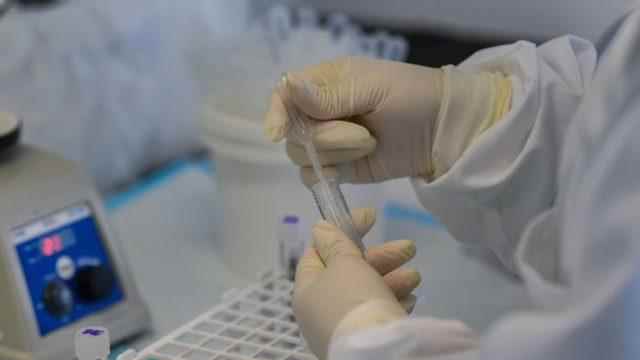Omicron has replaced the dominant Covid variants before it, such as Delta, in many countries.
Omicron also mutated within itself, creating sub-variants with some differences, and data indicate that the Omicron variant, called BA.2, is slightly more contagious than the others, according to the World Health Organization (WHO).
Omicron and its sub-variants are also transmitted to vaccinated people, but the Covid vaccines used are still thought to prevent the disease from being severe.
What is Omicron?
A variant is a form of a virus with minor changes or mutations. There are thousands of variants of the Covid virus circulating around the world, and this is very common as viruses are constantly changing.
Omicron differs significantly from other variants that started the Covid epidemic, as it has had a much larger number of genetic mutations.
Most importantly, there are significant variations in the outer part of the virus, which are spikes of spike protein targeted by vaccines.
This allows him to partially avoid the protective effect provided by vaccines or having had a previous Covid.
Omicron is therefore a highly contagious variant. Even people who have completed all their vaccinations can get this virus.
This variant can also be more easily transmitted to those who have been sick with another Covid variant before.
A study published in the UK in January revealed that two-thirds of those infected with Omicron had previously had Covid.
https://www.youtube.com/watch?v=2BFgQg9xKWE
What is BA.2?
When viruses mutate and new variants emerge, they can sometimes be divided into subspecies. For example, the Delta variant has 200 different sub-variants.
The same was seen on Omicron. Among them, there are BA.1, BA.2, BA.3 and B.1.1.529.
According to the WHO, approximately 99 percent of the samples submitted to the global GISAID database as of January 25 were this subvariant.
BA.1 and BA.2 are similar subvariants, but with 20 mutational differences between them.
BA.2 was first detected in the Philippines.
more contagious
In Denmark, SSI’s study of 8,500 households and 18,000 individuals concluded that BA.2 is “significantly” more contagious than BA.1.
The study also found some evidence that vaccines may be less effective against the BA.2 subvariant.
However, vaccinated people still have a lower risk of contracting this variant and transmitting it to others, compared to unvaccinated people.
In a study conducted in England, it was concluded that BA.2 is more contagious.
However, in both studies, there was no finding that vaccines were less protective against BA.2.
Are current vaccines adequate against Omicron variants?
Preliminary results of the first laboratory studies indicated that two doses of the vaccine would not be sufficient against the Omicron variant, and therefore a booster vaccination campaign was carried out in many countries, including the UK.
Studies conducted in England indicate that booster vaccines prevent severe disease to a large extent.
Like other Covid variants, Omicron and its sub-variants still pose a greater danger to the elderly and those with other serious health conditions.
While current vaccines cannot completely stop Omicron, they are currently the most important line of defense against Covid.
These have thus far largely prevented severe disease in those who contracted the other prominent Covid variants Delta, Alpha, Beta and Gamma.
When might more effective vaccines against new variants be available?
Updated vaccines to provide more effective protection against new variants of Covid are still in the design and trial phase.
Vaccine manufacturers can soon increase the pace of manufacture, and countries’ vaccine approval authorities are already considering how they can speed up these processes.

Moderna hopes to have an effective booster vaccine available against Omicron by March, but initial animal trials indicate it is not much more effective than current vaccines.
What about the other new variants?
The World Health Organization places the most dangerous variants on its list of “variants of concern.”
In the UK, authorities are currently watching closely for a mutation called AY.4.2, a sub-variant mutated from the Delta variant, or Delta Plus, and a mix of Delta and Omicron variants called Domicron or Deltacron.
Why are new variants coming out?
Viruses copy themselves to reproduce, but no copy can be 100% identical to the original. Errors in replication change the genetic makeup of the virus, which leads to the emergence of new variants.
If this change provides an advantage to increase the resistance of the virus, the new variant begins to dominate the others.
The longer the coronavirus stays in our body, the more it can copy itself, and the more likely it is that new mutations will occur.
For this reason, all efforts to minimize the spread, duration and severity of the disease are important. In this respect, vaccines reduce both the contagiousness and the risk of serious diseases, and to some extent prevent new mutations.
